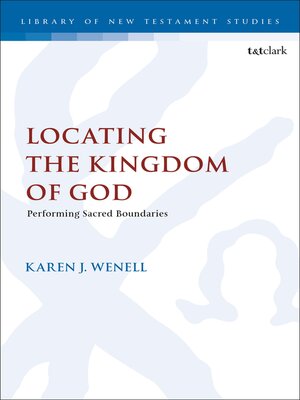Locating the Kingdom of God
ebook ∣ Performing Sacred Boundaries · The Library of New Testament Studies
By Karen J. Wenell

Sign up to save your library
With an OverDrive account, you can save your favorite libraries for at-a-glance information about availability. Find out more about OverDrive accounts.
Find this title in Libby, the library reading app by OverDrive.



Search for a digital library with this title
Title found at these libraries:
| Library Name | Distance |
|---|---|
| Loading... |
This book offers a new, multidisciplinary way of thinking about the Kingdom of God which fully recognises its sociological and spatial significance in performing boundaries of the sacred. Though spatial-critical perspectives have been increasingly recognised as important across many disciplines, the significance of non-physical religious spaces and their correspondence to boundaries of the sacred has not been explored fully, and never using the specific example of the Kingdom of God. Wenell considers the diverse and sometimes contradictory articulation of the Kingdom in the gospels as well as the ways that Kingdom language frames contemporary ethical debates. Her study of the Kingdom is located within the wider study of religion, affording the opportunity to investigate connections between space, belonging and the sacred.
Wenell structures her investigation in four key areas that engage with the Kingdom in different, but theoretically interconnected ways. She begins by setting out a theory of sacred space that is capable of including the Kingdom, and establishing key concepts such as boundary, performance, physical/non-physical spatiality, spokespersons and controversy. Wenell then focuses on the synoptic gospels and the origins of the Kingdom, noting aspects of uncertainty as well as areas of agreement and controversy over boundaries of the sacred in these uniquely interrelated texts. The third and fourth areas of investigation move into cultural reception, considering instances where the Kingdom is formative for identity and ethical relationships both in individual and wider group belonging terms. Specific reference is made to issues of ethical consuming and displacement, placing the Kingdom in dialogue with Bauman's discussion of a society of consumers, and Arendt's notion of equitable co-habitation of the earth.
Wenell structures her investigation in four key areas that engage with the Kingdom in different, but theoretically interconnected ways. She begins by setting out a theory of sacred space that is capable of including the Kingdom, and establishing key concepts such as boundary, performance, physical/non-physical spatiality, spokespersons and controversy. Wenell then focuses on the synoptic gospels and the origins of the Kingdom, noting aspects of uncertainty as well as areas of agreement and controversy over boundaries of the sacred in these uniquely interrelated texts. The third and fourth areas of investigation move into cultural reception, considering instances where the Kingdom is formative for identity and ethical relationships both in individual and wider group belonging terms. Specific reference is made to issues of ethical consuming and displacement, placing the Kingdom in dialogue with Bauman's discussion of a society of consumers, and Arendt's notion of equitable co-habitation of the earth.







